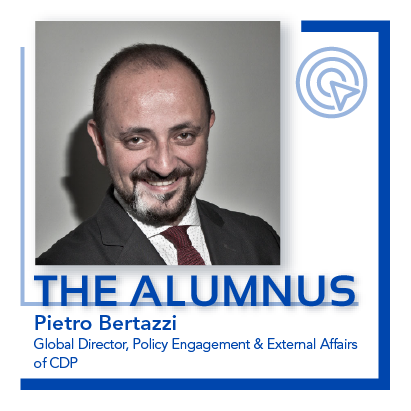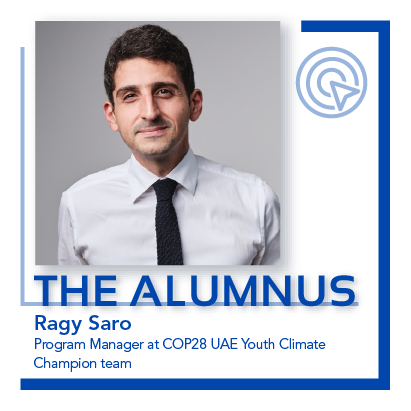
What Should We Expect from COP28?
WILL DECISIVE STEPS FORWARD IN THE FIGHT AGAINST CLIMATE CHANGE BE MADE UNDER THE EMIRATI SUN, OR WILL IT BE JUST A TRANSITIONAL STAGE? WE ASKED PROFESSORS VALENTINA BOSETTI, EDOARDO CROCI AND STEFANO POGUTZ, ALONG WITH ALUMNI PIETRO BERTAZZI, CRISTIANO RIZZI AND RAGY SARO. WHAT IS CERTAIN, THOUGH, IS THAT THERE WILL BE MANY REASONS FOR DISCUSSION IN DUBAI – FROM THE LOSS AND DAMAGE FUND TO THE GLOBAL STOCKTAKE PROCESSAt the end of the month, on 30 November, the 2023 United Nations Climate Change Conference (COP28) will officially kick off. The conference is the most important international forum on climate change, and this year it will be held in the United Arab Emirates. It is a chance for leaders from all over the world as well as experts from various sectors join together to discuss the progress of climate policies, with even the Pope attending this year. This conference, in the wake of COP25 in 2015 and the related Paris Climate Accords, serves also to recalibrate or establish further steps needed to achieve the main objective that emerged from the Accords: do everything possible to contain the global temperature increase to below 2°C by the end of the century from pre-industrial levels, aiming for a maximum increase of 1.5°C. It is a necessary yet complex and ambitious goal to save the planet, according to experts. While the scientific community is united in calling attention to the drastic consequences of climate change, the political will over the years to put its indications into practice has not been as steadfast. There will be many issues on the table in the Emirates, although experts doubt that this COP will decisively make an impact.
What is a COP?
COP is the acronym for Conference of the Parties, or the annual meeting of the 198 countries that have ratified the United Nations Framework Convention on Climate Change (UNFCCC). The Convention, which is considered the most important international treaty on environmental issues, was signed in 1992 in Rio De Janeiro, during what became known as the Earth Summit. It aimed to reduce greenhouse gas emissions and was complemented by successive protocols to set precise quantitative commitments, of which the best known is the 1997 Kyoto Protocol. The Conferences of the Parties was first held in Berlin in 1995 (COP1).
What to Expect from Dubai
"We certainly do not expect an acceleration of the decarbonization efforts; it will probably be a transitional COP," explains Edoardo Croci, Professor of Practice at Bocconi and Director of the University's Sustainable Urban Regeneration Lab. "It will not be the COP of resounding achievements, and although the current Nationally Determined Contributions (NDCs) – commitments to cutting emissions by the countries who adopted the Paris Accords – are not yet sufficient to have us fall within the established targets regarding global warming, it is expected that the next reinforcement of these measures will take place in 2025." What we should expect instead, "and this is a very important point," as Croci points out, "is for all the rules to finally be set in place to jumpstart the market for greenhouse gas emissions rights globally, which after Kyoto has only spread to certain areas, such as Europe." What does this all mean? Assuming that collaboration among countries cuts the cost of emissions reduction and that economic instruments have proven to be the most efficient in promoting reduction, "it would be a matter of creating a global market in which countries that manage to exceed their NDCs can sell their 'excess' contributions through instruments called Internationally Transferred Mitigation Outcomes (ITMOs) to other countries, so that the latter can rely on them to be included in their own NDCs".
The Issue of the Loss and Damage Fund
Another pressing issue in the Emirates will be the funding to be allocated to help the most vulnerable countries bear the effects of climate change. An important part of the Paris Accords is the financial agreement that sets a target of $100 billion per year as a contribution from developed countries to developing countries to advance their ecological transition until 2025. This amount has not yet been reached, and ends up being a battleground in all COPs. More recently, the Loss and Damage Fund was created, formally established at COP27 (Sharm-El Sheik) but not yet been made operational. While it does serve limited purposes, it also represents a step forward in international cooperation. "The fund was designed to help developing countries cope with the inevitable consequences of climate change – ones that go beyond the possibilities of adaptation," explains Valentina Bosetti, Full Professor of Climate Change Economics at Bocconi University. "The most vulnerable countries are already paying the costs, yet they have not contributed to the problem." On the Loss and Damage Fund, Bosetti points out that, "the entire battleground is whether who should put down the money and who should receive it. Developed countries, for example, are pushing for China to be included among the paying nations, but they are unwilling. Discussions also revolve around who should manage the fund: either the World Bank or a new independent structure. Developing countries consider this a priority, and failure on this issue could bring many others to a standstill."
Where the World Stands: The Global Stocktake
COP28 will also see the conclusion of the Global Stocktake process, i.e. the evaluation of each participating country’s progress (it should be noted that the European Union presents itself as a single player). From this point of view, what emerges in view of the COP is that a further acceleration of efforts is needed. In this context, however, two elements should be underlined: "As far as Europe is concerned, the commitment emerging from measures such as Fit for 55, is the goal of reducing net emissions by 55% by 2030," Bosetti further explains. "As far as the US is concerned, the recent introduction of the Inflation Reduction Act – the most significant industrial policy measure in recent years that supports US companies producing green technologies – is expected to have a positive impact on the environment" (click here for an analysis on the IRA by Daniel Gros, Director of the Institute for European Policymaking @ Bocconi University, and co-authors). Looking more broadly at the long-term goals set in Paris, however, "it is possible that we may not be able to contain the increase to 1.5°C above pre-industrial levels," the expert adds. "This does not mean, though, disregarding the Paris goal of keeping the global average temperature rise well below 2°C and pursuing efforts to avoid the rise to 1.5°C. The point is that every extra tenth of a degree we concede results in more damage done to the environment, and it is why we must not give in and slack on our commitment."
Natural Capital and Posidonia
Returning to the topic of financial instruments, if COP28 can be an opportunity to reactivate a global credit market for decarbonization – according to Edoardo Croci – it can also be an opportunity to define tradable credit mechanisms dedicated to biodiversity (Bocconi, together with EAERE and UCLG, will host a side event at COP28 on this very issue). "The idea," explains Croci, "is to move beyond forest sector carbon credits to ones that protect natural capital and biodiversity. There are currently no such economic instruments, as there are with ITMOs for climate."
'Nature-based' solutions are therefore also called into question in the fight against climate change. "One of the essential facts that has emerged in recent years is that thinking of technological solutions only is no longer enough to solve the problem," explains Stefano Pogutz, Professor of Practice of Corporate Sustainability at SDA Bocconi School of Management. "Nature-based solutions include forestation, but also the protection of, for example, posidonia – marine vegetation that is essential for the production of O2 and absorption of CO2. The Intergovernmental Panel on Climate Change (IPCC), the United Nations body for assessing the science related to climate change, has also stressed the need to enact these types of solutions and how, consequently, important it is to introduce financial instruments capable of protecting them."
COP, Politics and War
Beyond what will be gained from this COP28, however, one thing is certain, as Pogutz points out: "The science has been clear in establishing the relationship between anthropogenic pressure on the environment and climate change. Possible solutions have also been laid out and a roadmap created. However, in recent years – with first the pandemic, then the war – the focus has shifted from politics to the issue of security, with the climate crisis taking a back seat." This is not all. "Finance has returned capital to traditional forms of energy (oil and gas) which, with the rising costs, have generated substantial profits. Adding to this is the fact that renewables need billions of dollars in investment, discouraging political leaders from further reflecting on the environment." Pogutz concludes, "If we want to see the glass half full, the COPs have progressed with a few long strides – like in Paris – interspersed with many short steps, which have been fundamental in implementing policies. This could also be the case with COP28."



by Andrea Celauro
Translated by Rosa Palmieri
